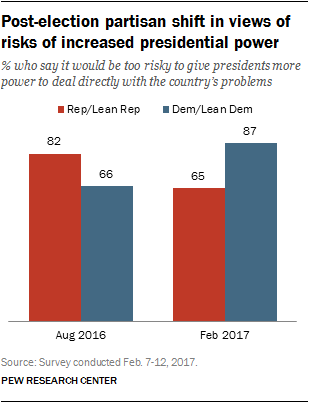“Any Republican Senator seeking the coveted LEADERSHIP position in the United States Senate must agree to Recess Appointments,” Trump posted on his Truth Social platform, adding that he wants positions filled “IMMEDIATELY!”
What Trump’s asking is technically constitutional, experts say, but would be a stark abdication of powers on the part of the Senate. And it could be just the beginning of Trump’s effort to get what he wants out of a Republican Congress.
...
“What Trump is essentially doing is telling the Senate to give up one of its core constitutional roles,” said Sarah Binder, a constitutional expert at George Washington University. “The Senate’s role of advice and consent was to be a check on who the president wants to put in these positions."
In 2020, Trump threatened to force Congress to adjourn to make appointments without Senate approval.
...
Several Republican senators have said they’re open to Trump’s plan to bypass the nomination process.
That’s rare. Josh Chafetz, a constitutional law professor at Georgetown University, said members of Congress are usually loathe to give up their constitutional power, even for presidents of the same party. Sometimes Congress has stayed in office in what’s known as a perfunctory “pro forma” session, rather than recess in full, to prevent presidents from installing appointees.
This time, all three leading Republican contenders for the Senate majority leader seem open to it. “100% agree,” Sen. Rick Scott (Florida) replied to Trump on social media. “I will do whatever it takes to get your nominations through as quickly as possible.” Sen. John Thune (South Dakota) told Fox News Digital that “all options are on the table.” And Sen. John Cornyn (Texas) said on social media that the Constitution “expressly confers the power on the President to make recess appointments."
Notwithstanding the legal opinions and practices of the preceding decades, a Department of Justice legal opinion and two federal appeals court decisions related to four controversial recess appointments made by President Barack Obama on January 4, 2012, raised questions about what a “recess” is with regard to the recess appointment power. 16 In a June 26, 2014, opinion, the U.S. Supreme Court addressed these questions. It held that the President’s recess appointment power extends to both intersession and intrasession recesses. The Court also held that the President may use the recess appointment power essentially only during a recess of 10 days or longer. A Senate recess of 3 days “is not long enough to trigger the President’s recess appointment power,” and a recess of more than 3 days but less than 10 is “presumptively too short to fall within the Clause” but “leaves open the possibility that a very unusual circumstance could demand the exercise of the recess-appointment power during a shorter break.” The opinion gave as an example of an unusual circumstance an instance such as “a national catastrophe … that renders the Senate unavailable but calls for an urgent response.” The Court noted that “political opposition in the Senate would not qualify as an unusual circumstance.” 17 Furthermore, the Court concluded that, for purposes of the Recess Appointments Clause, “the Senate is in session when it says it is, provided that, under its own rules, it retains the capacity to transact Senate business.” 18 This implies that the Senate would also determine if and when it will adjourn for a recess of 10 days or longer and thus allow for the possibility of recess appointments. Under the Adjournments Clause of the Constitution, however, such a determination requires the consent of the House.19 Consequently, either the Senate or the House can unilaterally prevent a Senate adjournment of 10 days or longer that would permit the President to exercise his recess appointment authority.

